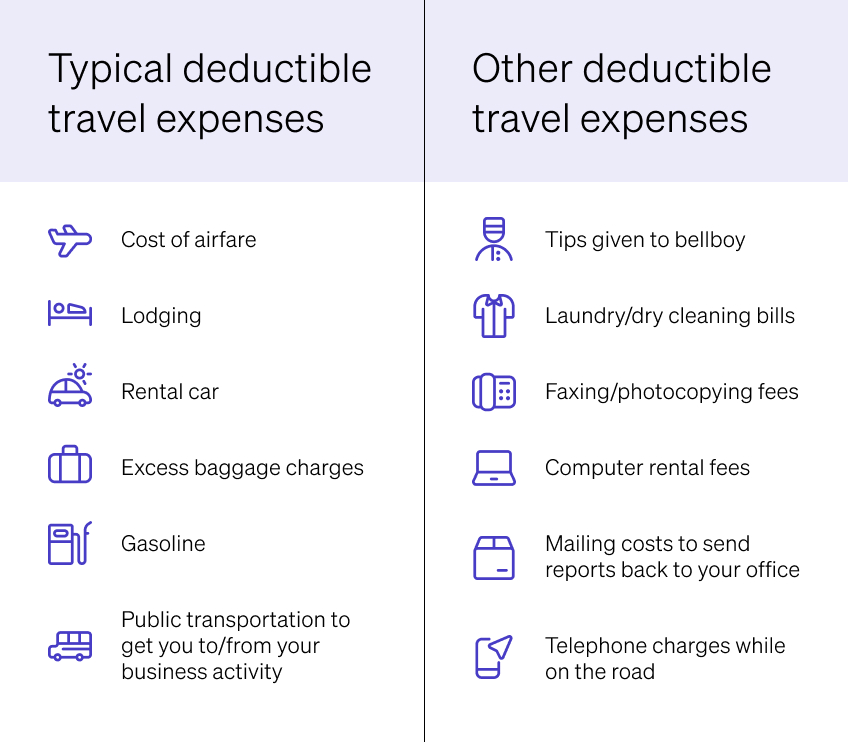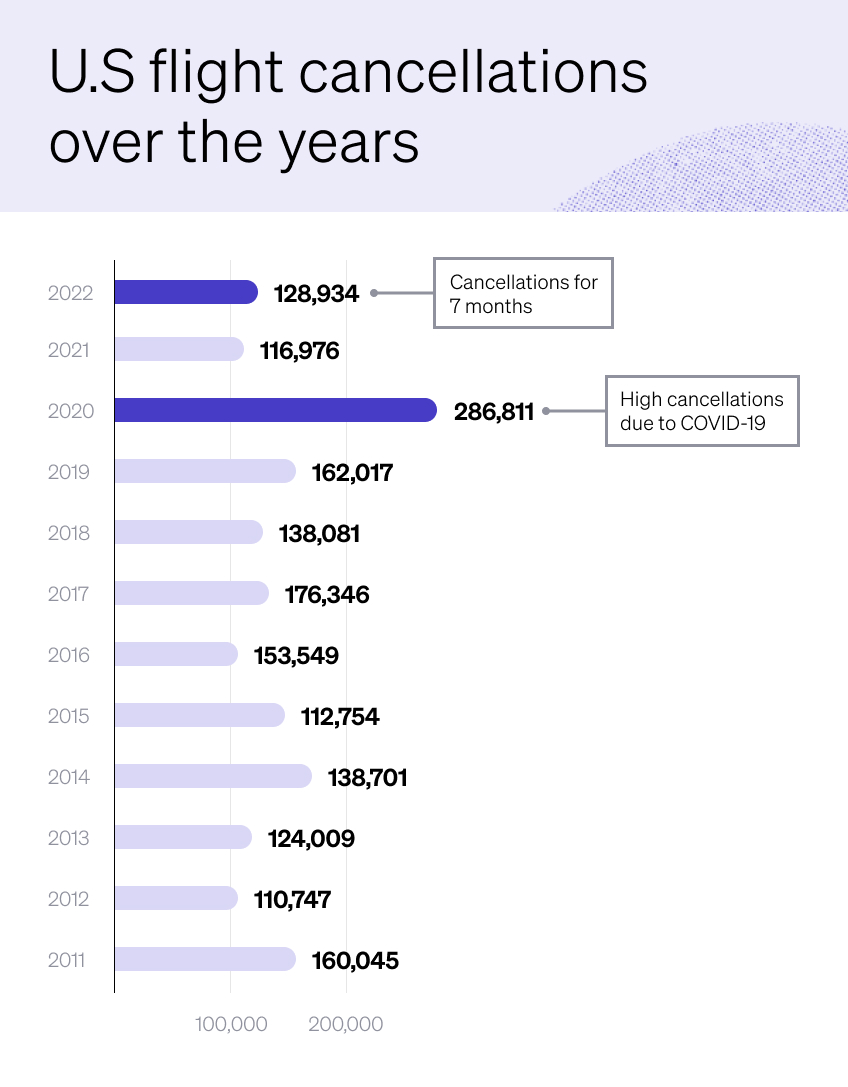Keeping up with business travel expenses can become a full-time job. But let's face it. You've already got enough on your plate. Do you really have time to engage in corporate travel management, too? Probably not.
The good news is that business travel management doesn't have to be a resource drain. You can effortlessly keep up with business travel expenses with the right approach and tools. Here's everything you need to know.
What is a travel expense?
Travel expenses are the expenses incurred when business calls for employees to travel. Reimbursing employees for these expenses is tax deductible as long as they represent actual expenses for ordinary and necessary business purposes.
List of deductible travel expenses
What is a travel expense?
Travel expenses are the expenses incurred when business calls for employees to travel. Reimbursing employees for these expenses is tax deductible as long as they represent actual expenses for ordinary and necessary business purposes.
List of deductible travel expenses
A business can deduct expenses even if their employees used their own personal funds to pay for them, as long as those expenses are legitimate tax deductions that are ordinary and necessary to the business, and as long as the company reimburses the employees for those expenses according to a compliant expense policy.
Self-employed individuals can generally deduct these expenses on their tax return as well.
Flights & transportation costs
These are the actual costs incurred in getting from one place to another, including flights as well as ground transportation, such as car expenses—mileage, rental cars, parking fees, business-related tolls, and the like.
Accommodation
Lodging reimbursements are generally deductible as long as the company policy sets reasonable per diem rates. These rates depend largely on the location visited. A standard rate for a single room in one location can vary significantly compared to another, such as a major metropolitan city compared to a rural factory town or similar work location.
Meals and incidentals
Meals and incidental expenses while traveling are 50% deductible as long as they meet the following conditions set forth by the IRS:
- Business purpose, not personal
- Not lavish or extravagant
- You had to sleep overnight away from home (your "tax home" is the whole city where you live)
- Must be a temporary location—can't be an indefinite work assignment (more than one year away)
- Not for entertainment purposes—these expenses are generally no longer tax-deductible
The IRS rules and guidelines make it clear that valid expenses include dry cleaning or laundry, business communication, and tips related to other valid travel expenses, like tipping hotel staff.
Other potential expenses
In general, any ordinary and necessary expenses can be deducted, although any travel expenses that aren't explicitly listed would have to be evaluated on a case-by-case basis.

Managing business travel expenses
Hitting the road or booking a flight for a business trip represents an important business activity. While you can conduct some business meetings digitally, some things just need to be discussed in person. However, it's vital that you've got a sound strategy for tracking travel-related business expenses so you can stay on budget while also seizing emerging opportunities to grow your company.
What is travel expense management? (And how it impacts your business)
Corporate travel management oversees all aspects of business travel, including:
- Determining what airport or train station to use
- Keeping records to deduct business travel expenses
- Identifying ordinary and necessary expenses
- Deciding which business destination will provide the best return on investment
- Determining the actual cost of a trip
- Calculating the costs of hotel rooms, ferry fees, business meals, and transportation expenses at standard mileage rates
- Filing business travel deductions with the Internal Revenue Service
- Claiming these expenses on the company's income tax return
Managing business travel expenses is a complex process involving much more than just comparing hotel room or flight rates. You'll need to accurately calculate business travel expenses to decide whether paying for a trip makes sense for your company.
You'll also need to create an expense policy that details what standard meal allowance you provide, what personal expenses aren't eligible for reimbursement, and other particulars. This way, your team members can budget accordingly when embarking on a trip for business reasons.
4 business travel and expense management challenges (and how to solve them)
Knowing what goes into the process is one thing – doing the job well is another. Here are some of the problems you might encounter when scheduling business travel.
Challenge #1: Lost money from cancellations
Canceled flights and unused tickets can eat away at your budget and drive up the travel cost of a trip without yielding any benefits.
From January to July of 2022, the airlines canceled nearly 129,000 flights in the U.S., which was an 11% increase from 2019. The good news is that cancellation rates improved in 2023, dropping to 1.29%, a ten-year low. Sounds like a step in the right direction.

Still, you can't risk your entire trip being unraveled due to a cancellation. Here are a few tips to help you minimize your losses:
- Schedule flights with long enough layovers, so your employees don’t miss their connecting flights
- Stay in contact with employees while they’re traveling so you can help them address delays and other problems quickly
- Have a Plan B in place if a flight is canceled.
A corporate travel manager who plans ahead of time will prevent your company from missing important meetings and wasting money on travel.
Challenge #2: Making sure employees are compliant
Your corporate travel specialist created a fantastic policy for your business – everything is in there, and there’s no stone left unturned in terms of compliance.
Remember, business travel deductions are permissible only if money is spent on certain items, like business-related travel, lodging, and meals. But how do you get your employees to read the policy, let alone remember all the details?
You can take a few proactive steps to empower your employees to stay within your company policy’s boundaries:
- Make your travel policy accessible online
- Consider sending email reminders to employees before they travel, highlighting the essential points to remember, such as travel insurance requirements and current safety best practices
By ensuring your employees comply with company policies, you will ensure every trip adheres to travel expectations, and you stay within the IRS’s framework of tax-deductible requirements.
Challenge #3: Wasting time on paperwork
When there are too many requests and approval needs, and all you have is someone from your admin team fielding everything, your company might be bogged down with unnecessary paperwork.
When managing corporate travel, you must diligently ensure every detail is addressed. Approvals for costs, chasing employees for receipts, and contacting travel agents to find better deals can pile up to create a lot of busy work.
Instead of letting travel management get out of control from a resource perspective, use tools to automate or simplify tasks, such as booking trips and tracking expenses.
Challenge #4: Runaway travel costs
Incurring business expenses come with the territory of planning company or employee trips. Without proper planning, employees might overspend or incur nondeductible costs. However, you don't have to let these costs become a runaway train that busts your budget.
Create a detailed policy that outlines basic reimbursement rates, per-diems for meals, and other perks. This way, employees will know precisely what purchases they can and cannot make during a trip. Simplify meal expense tracking by giving your team members their per diems ahead of time.
Doing so gives them the freedom to budget their meal costs based on personal preferences. They'll also be able to splurge on a meal or two during the trip without overcharging the company credit card. If they burn through their meal allowance on a given day, they can decide to use personal funds to cover the difference.
You'll also need to set clear limits on spending for other expenses, such as taxis and ferries. While it's best to charge these costs to the company card, you also need to let employees know what is and isn't acceptable. For instance, if you authorize employees to order Uber rides with the company credit card, let them know whether they can book a luxury vehicle or if they've got to stick with a basic ride.
How to save money on travel expenses
Want to lower your travel reimbursements? Try these proven strategies for cutting back on services related to travel and the cost of being away from your main place of business:
- Be flexible with your travel dates and consider traveling during off-peak season
- Look for deals on flights and accommodations
- Consider alternative lodging options like hostels or home exchanges
- Cook some of your meals to save on food costs
- Use public transportation whenever possible
- Track your spending during your trip—this also helps when it's time to claim your expenses
3 benefits of effective business travel management
With effective business travel management, your business can save money, save time, and get more out of business travel. Here’s how.
Benefit #1: Reduce costs associated with business travel
A dedicated travel manager --- or an outsourced business travel management company --- will help identify cost-saving opportunities. They'll capitalize on these opportunities by shopping rates, comparing hotel options, and choosing lodging accommodations close to meeting areas to minimize travel costs.
The best planners can further reduce your costs by using their industry contacts to negotiate lower prices with vendors.
This will your company save even more money (thus improving cash flow, which is a win-win).
Benefit #2: Save time with streamlined processes
Travel managers are planning pros. They have the know-how and processes in place to save time and plan important trips faster.
Tech-savvy travel managers also use software and automation tools to reduce the risk of human error. That means fewer cancellations and last-minute itinerary changes. Eliminating these types of errors can make travel less stressful for your team members and allow them to focus on the task at hand, making strategic moves for your business. Combined with the time savings, that's a win-win!
Planning software doesn't just reduce the risk of human error. Some of the best solutions can also automatically feed expense data into your accounting software, resulting in a simplified reimbursement and deduction process.
Benefit #3: Improve business travel for employees
Another advantage of successful travel management is the business trip experience. Employees will enjoy the experience more if it’s well-managed.
By booking hotels close to the airport, ensuring employees stay in a safe area of town, and optimizing the trip experience by choosing the providers employees prefer, your company’s business travelers will have less stress while on the road.
That means they can worry less about navigating business travel logistics, rest easy, and focus more on the presentation, business meeting, conference, or other reasons for their trip. Ensuring your employees are prepared and relaxed will give your business more bang for its buck.
Take control of your business travel expenses with BILL Spend and Expense
Manage business travel better with expense management software from BILL. We offer small business travel management solutions and scalable tools to support your company's needs as it grows. You can set spending limits and manage all your travel expenses in one place. Request a demo today and ensure your business will never exceed your travel budget!


